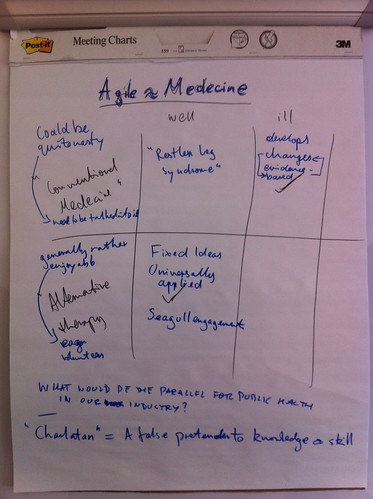I used to think people like you were quacks, but now I see that there are teams that really need your services.Grauenwolf and I have both been on reddit or a good long while and we've had a few...full and frank exchanges of opinion about the merits of this thing called "Agile". The issues I wanted to address in the session were: what causes competent professionals like grauenwolf to think that the sort of people who would go to something like an "Agile Coaches Gathering" are quacks, and what changes their mind? How might we do less of the former and more of the latter?
The output is captured here:
It needs some explanation, though.
"Quack" is an evocative word. "Snake-oil salesman". "Charlatan". We felt that these words appeal to an analogy something along these lines: Agile consultants are like bogus medical practitioners.
The poster shows a 2-by-2 matrix (naturally!): well or ill against conventional medicine or alternative therapy. The model is that conventional medicine is mainly for people who really are ill and need to get better, while alternative therapy is mainly for people who are basically well but feel entitled to be "well-er".
Yes, that is quite cynical. We did talk about the fact that some alternative therapies do work, for the things they work for, but when that happens it's not for the reason that the practitioner thinks. And we talked about how some conventional medicine is not nearly as well founded as many people would like (you) to think. But, bear with me.
So, the top right and bottom left cells of the chart are the exemplars. Bottom right is the really bad place: trying to treat a mangled road traffic accident victim with a very, very, very dilute solution of London Bus, for example. Top left is pretty bad too: pushing pills for restless leg syndrome and things even less needing of allopathic intervention.
It seems that there is a problem with some kinds of Agile coaching or consulting or training or certification practices. They could be trying to address a really serious organizational problems with techniques that cannot possibly help (and maybe they even know it), or they can be barging in to teams that are functioning perfectly well and crashing about the place changing things that don't need to change.
How could we recognise these cases? Maybe this way:
- conventional medicine often leads to treatment regimes that are quite unpleasant
- people often need to be talked into consulting a conventional medic (partly because of [1])
- alternative therapies are often really rather enjoyable
- people often self-refer to an alternative practitioner (partly because of [1])
How to increase the chances that you're really helping? Look for objective evidence of improvement, change your behaviour based upon that evidence.
The final question we came up with extends the analogy. If Agile coaches are a bit like certain kinds of medical practitioners, then what is the equivalent for us of public health?

5 comments:
Interesting topic. I'd say rather that "Agile consultants are (mostly) like medical practitioners circa 1850". i.e. Not so much bogus as ignorant (and hiding that ignorance under a veil of affectation and supposed expertise).
I would love to engage with your closing question - to that end could you define what "public health" means to you, in that context?
Cheers
- Bob @FlowChainSensei
More sorry than ever that I missed this gathering, family commitments. Hopefully I can make the next one, and then I too can be a fully fledged charlatan :)
@Bob The characteristics of public health that I'd look to are that it requires individual action for the general good. There's a whiff of game theory to it.
If almost everyone else is inoculated against Blue Fever then I will be safe if I don't get inoculated, but if everyone thought that way then soon we would all be at risk.
Or there again, I'm reminded of observing parts of the world where water sources must be assumed hazardous unless a sign tells you that it's safe to drink versus those where a water source can be assumed safe and a sign will tell you if it isn't.
There's an element of authoritarian compulsion to it, as well.
How all that maps onto our business I'm not sure yet...
@Keith,
From a Rightshifting perspective, I'd say that our equivalent of "public heath" is the prevailing mindset in the general population (society at large, or the world's knowledge businesses - take your pick) towards the "way the World of Work should work".
-Bob @FlowChainSensei
Found your post interesting to read. I cant wait to see your post soon. Good Luck for the upcoming update.This article is really very interesting and effective.
Post a Comment